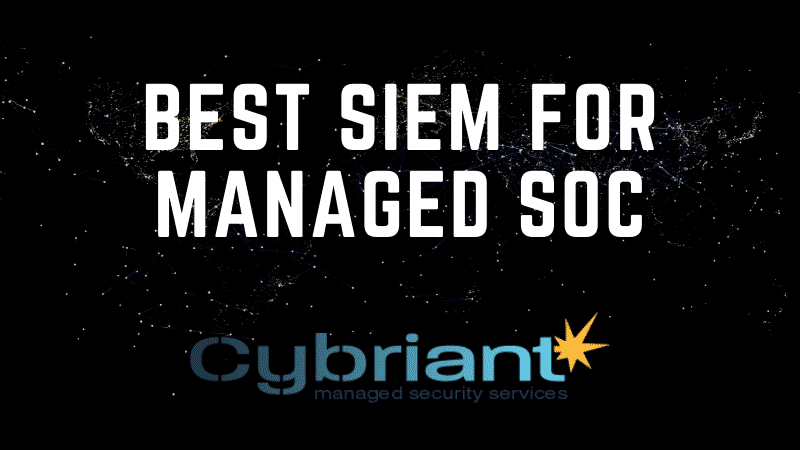What is the best SIEM for a Managed SOC? Security information and event management (SIEM) software, is software that grants security professionals in enterprises insight, as well as a track record of the activities taking place in their IT environment.
SIEM technology has been around for more than a decade. It started as a log management discipline but has quickly evolved. It now combines security event management.
In this article, we will take a look at managed SOC as well as three SIEMs that are ideal for managed SOC.
What is a Managed SOC?
A SOC as a Service or managed SOC is a subscription-based offering that enables organizations to subcontract threat detection as well as incident response. It is built on the notion of developing an internal security operations center (SOC) into an external cloud-based service.
With a managed SOC, organizations get external cybersecurity experts mandated with monitoring their logs, cloud environments, and devices, as well as a network for identified and evolving advanced threats.
Posed as a managed service offering, managed services offer organizations an array of cybersecurity experts that are tasked with monitoring, detecting, as well as investigating threats throughout the organization’s whole enterprise.
In some events, the remediation of identified threats can be done by the outsourced security team. In other cases, the SOC squad teams up with the internal IT teams to remedy detected threats.
A managed SOC can offer 24/7 monitoring without needing organizations to invest significantly in security software, hardware, or any other infrastructure. Instead, organizations can get a SOC quickly and start scanning for cyber threats, cost-effectively boosting the organization’s security position.
Why should you use a managed SOC?
Organizations that are focused on their cybersecurity will come to the realization of how important the cost is as well as the time required to get security experts, negotiate as well as buy security software and equipment, install and configure the SOC, and then start working to detect threats.
As such, when organizations are looking at setbacks in setting up their SOC, the issues are usually the following:
- They have little internal security and/or SOC expertise– With managed SOC providers, they get experts who are good at directing the security operations of companies from around the world in pretty much every industry.
- There are not enough funds for capital expenditures- With managed services, the capital expenditure that you’d normally need to set up a SOC is swapped for a monthly operating expense.
- It takes a long time to set up your SOC- The time needed to build a SOC team, get infrastructure, as well as license and execute the software is scrapped away by the managed SOC’s functional team.
- An internal team may not necessarily boost a company’s security posture- Getting a managed SOC affords you cutting-edge threat intelligence, experienced cybersecurity analysts, and advanced security monitoring and response solutions. A company’s security position, whether on-premises or in the cloud, is greatly enhanced once the service is executed.
- An internal SOC may not be affordable- A subscription to a managed SOC can be more cost-effective than what it costs a company to set up its SOC. In most cases, the monthly subscription cost is usually less than the expense of internal security analysts alone which would need to be obtained (without factoring in the cost of setting up the SOC itself).
A managed SOC enables organizations to rest assured that their entire network is constantly under watch for new cyber threats, for much less than it would cost to do it on their own.
Benefits of a Managed SOC to an Organization
Companies that leverage managed SOCs register perks for their threat detection, response, staffing, and cost. These benefits include:
Reduces SOC complexity
The amount of work needed to design, execute, configure, test, direct, maintain, upgrade, as well as operate an in-house SOC is not something most companies have the expertise or time to do effectively, if at all. By choosing to get a managed SOC, they simplify the equation. This is because they pay for an already existing service.
Boosts the speed of deployment
Because you don’t have to build a SOC, the time needed to deploy is reduced significantly. Instead of taking years to get on its feet, a managed SOC will be up and running your company’s environment in no time.
Immediate expertise
Not every company has the benefit of in-house cybersecurity experts. Not many can afford to hire them. However, with a managed SOC, organizations can gain access to a squad of cybersecurity experts and analysts that are skilled and experienced to detect and remediate the current cybersecurity threats.
Boosts threat detection and response
Providers of managed SOCs are usually better equipped at providing threat detection and response than their client companies. Leveraging the latest threat intelligence, a squad of dedicated security experts, the best security solutions, as well as automated response, managed SOCs increase the speed, effectiveness, and ability to detect threats and respond to them as opposed to internal security teams.
Affordable security
The shift from companies paying for every aspect of an in-house SOC to making single payments every month makes the managed SOC an affordable choice. Furthermore, there is the safe assumption that costs will be reduced significantly while maintaining improved levels of security.
Best SIEM for Managed SOC
Here are the recommendations based on Cybriant’s expertise:
AlienVault USM Anywhere (AT&T Cybersecurity)
USM Anywhere is a SIEM solution that focuses mainly on threat response and detection. It uses several supported sensors that have in-built network intrusion detection to gather events and log information. In case support for a needed sensor is not available, subscribers can ask for help from AlienApp collectors.
This SIEM solution brings together threat detection, compliance management, and incident response across environments to make threat management easier for security professionals.
The platform boasts many crucial automated features, simplifying deployment, and reducing the burden on security teams. It also does away with the need for additional security tools. For example, USM Anywhere is linked directly to the MITRE Database and Open Threat Exchange. This means there’s no need to buy additional threat feed tools.
Pros
- Is user friendly
- Offers out-of-the-box content that is easy to implement and use
- Has a Guided Tour that provides a walk-through
- Integrates with many different platforms
- Collects lots of data from every integrated platform as long as the right level of logging is enabled
Cons
- SIEM implementation may be a little challenging
- Reports are clunky and a tad tedious to parse through
Google Chronicle
Google Chronicle is a Security Operations Suite that helps organizations detect threats, investigate incidents and respond to security events. It offers a comprehensive solution for all of an organization’s security needs, providing visibility into potential threats and attack vectors and helping organizations uncover hidden threats they may have missed.
Additionally, Google Chronicle provides analytics and insights to help organizations understand their security posture and make data-driven decisions. With Google Chronicle, organizations can monitor their security environment in real-time and get the visibility they need to detect potential threats before they become a problem. Google Chronicle’s advanced analytics capabilities also mean that security teams can quickly make sense of large amounts of data and identify suspicious behavior or potential threats.
Finally, Google Chronicle helps organizations respond quickly to security incidents by providing proactive measures and incident response guidance. The solution allows security personnel to investigate incidents, understand the context of the attack, and take appropriate actions to prevent future attacks. Google Chronicle provides an easy-to-use interface for security teams to confidently manage their security operations, giving them the power to make sound decisions in a rapidly changing environment.
Netenrich
Netenrich provides end-to-end security operations services that help organizations detect, investigate, and respond to cyber threats. Our innovative security platform combines advanced analytics capabilities with machine learning algorithms and real-time threat intelligence so that our clients can quickly identify suspicious activities before they become a problem.
Netenrich also offers robust security automation tools that enable organizations to automate repetitive tasks and reduce the time spent on manual work. Our platform can be used to perform various functions such as asset discovery, vulnerability scanning, patch management, threat modeling and more.
Netenrich is also an expert in incident response services, offering customers guidance and support when responding to cyber threats. Our team of experts provides comprehensive investigations and evidence-driven recommendations on how best to respond to security incidents with minimal disruption.
Overall, Netenrich helps organizations protect their networks from cyber threats by providing an integrated platform that automates and simplifies security operations. With our services, customers can reduce the complexity of managing cyber threats and stay ahead of the constantly evolving threat landscape.
We’re proud to offer our customers the best in security operations services, giving them the peace of mind that their networks are secure and protected from malicious actors. Our team strives to empower organizations with the knowledge and expertise needed to protect themselves against cyber threats, reducing risk and enabling them to focus on business growth.
SECEON
Seceon’s Open Threat Management Platform is directed towards simplifying SIEM deployment, as well as other security programs for all organizations.
Seceon can run fully on-premises, on the cloud, or in a hybrid environment. Once set up, it collects information from various sources. However, it can also collect its data and even boasts of its threat feed, which it leverages when correlating with events that are in a protected network.
It goes through all the systems and logs files that are generated by firewalls, routers, as well as other communications equipment. It provides collector programs in the form of agents for every Linux or Windows box. The collectors pulley system and log files and direct them into a pile of other data to be analyzed.
In case an organization wishes to retain the full text of the logs, they can be copied and saved.
Pros
- It is easy to manage yet has comprehensive solutions
- Has good customizations with many integrations
- Is multi-tenant and onboards fast
- Fully stable
- Support is good
Cons
- Needs more compatibility for co-managed solutions
Microsoft Azure Sentinel
Azure Sentinel is Microsoft’s SIEM and security orchestration automated response solution rolled into one.
It draws together state-of-the-art security innovation as well as advanced AI to give you near real-time intelligent security analytics. This in turn gives you a bird’s-eye view of your enterprise’s IT estate.
Sentinel allows you to access security-related data from nearly any source. This bypasses the need to direct several pieces of sophisticated and costly infrastructure components- while providing you with a cloud platform solution that is easily scaled to your needs.
Sentinel leverages AI models and machine learning to identify important insights that are based on data gotten via a diverse catalog of data connectors. This includes default connections to all Microsoft sources, coupled with several native third-party connectors such as AWS, Barracuda, Cisco, and Symantec, among others.
Microsoft Sentinel integrates with a diverse range of systems, giving you the option of automating your incident response. This allows you to manage your activities efficiently and effectively.
Pros
- Easy to set up
- Works well with other Microsoft tools
- Fast deployment
- Doesn’t require you to deploy any infrastructure on-premises to manage it
Cons
- Little online training available
- Poor integration with third-party tools
Conclusion
No matter which SIEM solution you choose, be sure the managed services provider you work with has in-depth knowledge of that SIEM to be able to help you prevent, detect, and remediate any threats. If you would like specific experience with any of these SIEMs, let us know how we can help.



